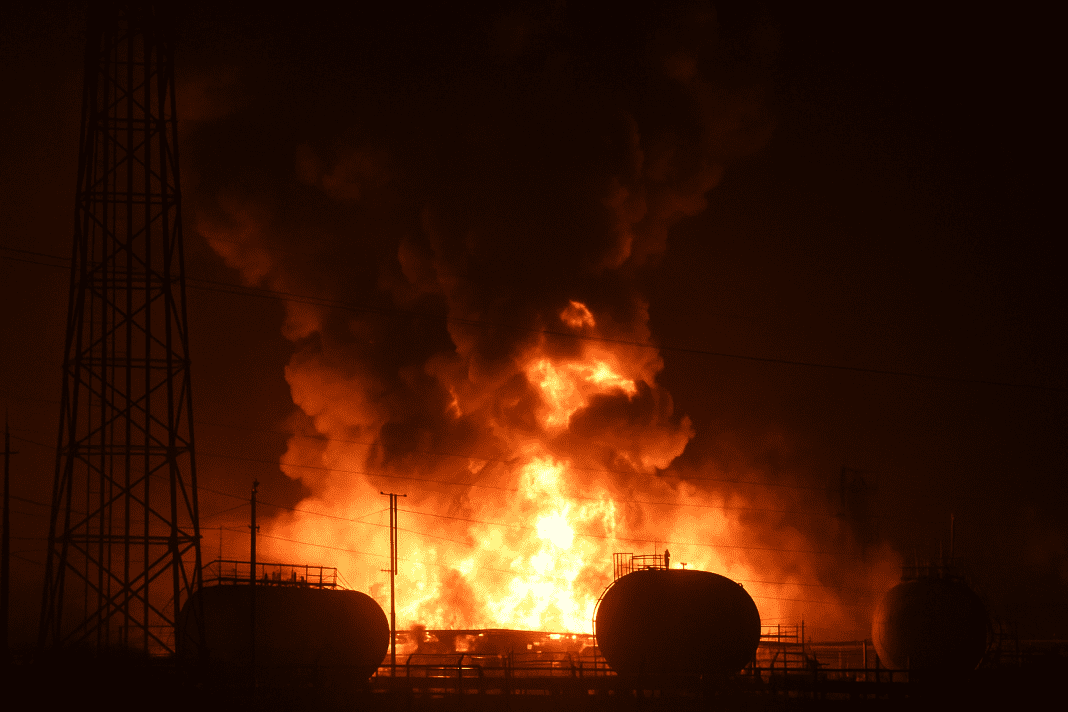In recent weeks, a new and dangerous development has unfolded in the ongoing conflict in Eastern Europe. Reports indicate that Azerbaijan may reconsider its current stance on weapons supplies to Ukraine after a string of Russian attacks on Azerbaijani energy sites inside Ukraine.
Repeated Strikes on Azerbaijani Energy Sites in Ukraine
The most recent incident occurred overnight on August 8, when five Shahed drones reportedly targeted an oil depot in Ukraine’s Odesa region. A state-owned energy company from Baku operated one of the major Azerbaijani energy sites, which Russian drones attacked, sparking a major fire and damaging a diesel pipeline. The incident seriously injured four workers.
This was not an isolated strike. In late June, another attack reportedly hit a gas distribution station near the settlement of Orlivka. This station was part of the Trans-Balkan pipeline, a key route for transporting Azerbaijani gas into Ukraine. That pipeline began carrying Azerbaijani gas following an agreement reached in late July.
Local media from Azerbaijan reported that Azerbaijani energy sites had been “systematically” targeted in recent weeks. The attacks have caused significant damage to infrastructure and disrupted operations. They have also raised alarm in Baku, as the strikes appear to directly hit not only physical assets but also long-standing economic ties between the two countries.
Armenia Azerbaijan Peace Deal Faces Unexpected Challenges
Potential Policy Shift Over Attacks on Azerbaijani Energy Sites
For much of the ongoing conflict, Azerbaijan has maintained a neutral position in terms of direct military aid. Since the start of the full-scale invasion of Ukraine in early 2022, the country has refrained from supplying lethal weapons to either side. Instead, it has focused on humanitarian support, providing energy equipment, infrastructure repair assistance, and financial aid. Reports suggest that the total value of this non-military assistance has already exceeded $40 million by mid-2025.
However, prior to the war, Azerbaijan had provided Ukraine with certain military equipment. This included drones, armored vehicles, and other supplies that contributed to Ukraine’s defense capabilities. That support stopped once the country adopted its official non-lethal aid policy.
✈️ RAF Akrotiri Under Watch? British Man with Azerbaijani Roots Accused of Spying for Iran
The recent escalation in attacks on Azerbaijani energy sites in Ukraine has now reportedly triggered discussions in Baku about changing this approach. According to local media, officials are considering lifting the ban on supplying weapons from Azerbaijan’s arsenal to Ukraine if the strikes on its interests continue.
This possible shift in policy was reportedly a key topic in a phone conversation between the leaders of the two countries on August 10. The attacks and their impact on bilateral cooperation were discussed, with both sides expressing strong condemnation of the strikes.
Strong Energy and Trade Ties at Risk
Azerbaijan and Ukraine have built a long-standing relationship based on energy and trade. Ukraine imports Azerbaijani oil and gas, while Azerbaijani companies have expanded investments in Ukraine’s fuel storage and distribution networks.
The state-owned oil company from Azerbaijan has played a particularly prominent role in Ukraine’s energy sector. Its operations include depots, fuel stations, and other Azerbaijani energy sites that are vital to the country’s fuel supply. These projects are seen as essential for both economic cooperation and energy security.
The strikes on the oil depot in Odesa and the gas station near Orlivka have therefore carried a dual impact — damaging infrastructure and putting a strain on economic relations.
Azerbaijan Airlines Crash in Kazakhstan: 38 Dead, 29 Survive
Reports from Azerbaijani media describe the recent attacks as not only damaging to physical assets but also as a direct blow to the cooperation between the two countries. Repeated targeting of Azerbaijani energy sites has led officials in Baku to fear that someone is deliberately undermining their investments and supply networks.
These developments have now placed Azerbaijan’s position at a critical point. While the country has so far resisted taking sides militarily, the ongoing attacks on Azerbaijani energy sites in Ukraine have introduced a new factor that could influence its policies.
